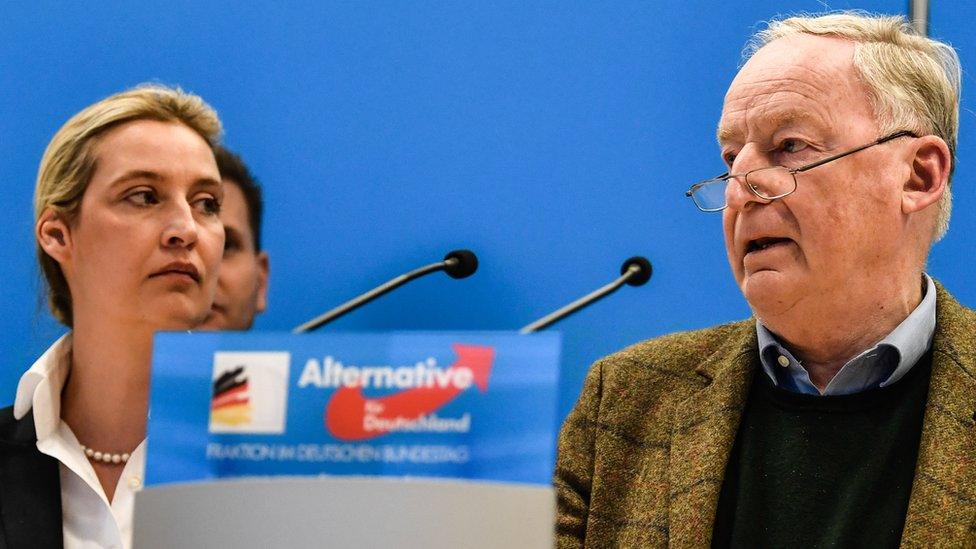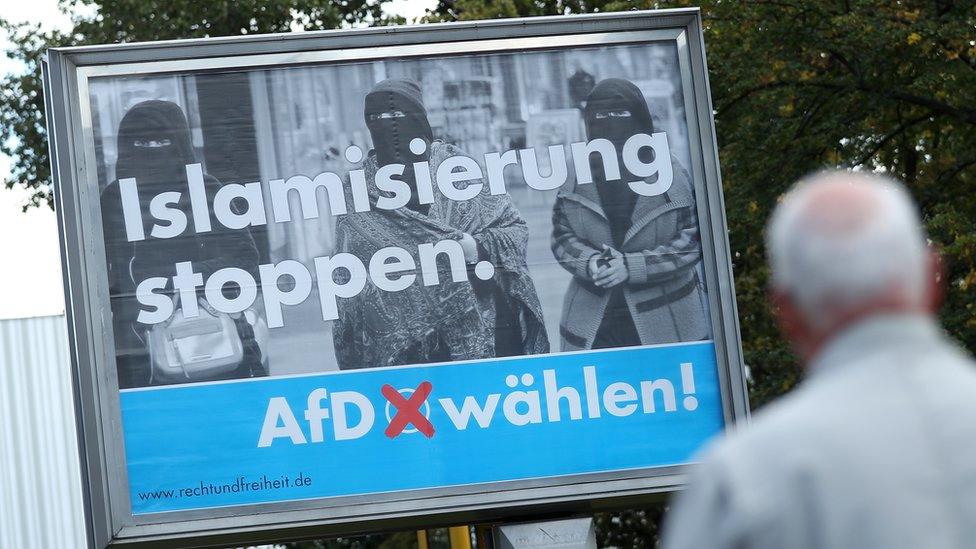German far-right MP 'could be absolutely controlled by Russia'
- Published
In 2017, Gabriel Gatehouse showed Markus Frohnmaier a document suggesting Russian support
A German politician could become an "absolutely controlled" MP in the Bundestag, according to Russian documents seen by BBC Newsnight.
The politician, Markus Frohnmaier, is a member of the German parliament from the far-right AfD party.
The documents date back to April 2017, when Mr Frohnmaier was a candidate for election to the Bundestag. He was subsequently elected in September 2017.
Mr Frohnmaier told the BBC he had no knowledge of the documents.
The AfD (Alternative for Germany) is now the main opposition party in the German Parliament.
Joint investigation
Mr Frohnmaier has frequently spoken out against EU sanctions on Russia, and made trips to Crimea, the Ukrainian territory annexed by Russia in 2014, as well as parts of eastern Ukraine controlled by pro-Russian separatists.
The documents were obtained by the Dossier Centre, an organisation that aims to investigate Kremlin attempts to influence politicians abroad.
The Dossier Centre is funded by Mikhail Khodorkovsky, a former Russian oligarch, an opponent of President Vladimir Putin who spent nearly 10 years in jail in Russia.
The BBC conducted a joint investigation into the documents together with the German magazine Der Spiegel, the German TV channel ZDF and the Italian newspaper La Repubblica.
The documents provide an insight into so-called "active measures" - Russian attempts to influence Western politics.
The main document, written in Russian, appears to be a strategy paper detailing general attempts to influence public opinion and decision-makers across the EU on topics such as Crimea, Ukraine and EU sanctions against Russia.
But right at the end, there is something more specific.
Under the heading "elections to the Bundestag", the document names one candidate: Markus Frohnmaier.
It goes on:
"Chances of being elected to the Bundestag: high."
"Required: support in the election campaign."
There follows an assessment of Mr Frohnmaier's potential value to Moscow if elected to the German parliament:
"Result: We will have our own absolutely controlled MP in the Bundestag."
The document was attached in an email, also seen by the BBC.
The email was sent by Petr Premyak, a former naval counterintelligence officer and a former member of the upper house of the Russian parliament.
Mr Premyak confirmed to a reporter from ZDF that he wrote the email, but said he was not the author of the attached strategy document.
The recipient was Sergei Sokolov - a senior official in President Putin's administration.
It is not clear whether the Kremlin acted on the recommendations in the document, and there is no evidence that Russia provided any "material support" to Mr Frohnmaier's campaign.
Separately, the BBC obtained another document, also from April 2017, that appears to be a request for help written on behalf of Mr Frohnmaier's campaign.
This document is written in occasionally faulty English, and is entitled: "Frohnmaier election campaign/action plan (draft)".
"For the election campaign we urgently would need some support," the letter states.
"Besides material support we would need media support as well […] any type of interviews, reports and opportunities to appear in the Russian media is helpful for us."
During the campaign, the document promised, Mr Frohnmaier would focus on topics including "Good relations with the Russian Federation: Sanctions, EU interference in Russian domestic politics."
And if elected, Mr Frohmaier would "immediately start operating in the foreign policy field".
'Fake document'
Mr Frohnmaier told the BBC he had no knowledge of the Russian document obtained by the Dossier Centre, nor of document apparently written on behalf of his campaign.
"I think that's a fake document," he said.
Asked whether he could explain how the authors of the Russian document came to the conclusion that he would be an "absolutely controlled MP", Mr Frohnmaier said, in a statement from his lawyers: "Our client emphasises that he was never under the control of any third party.
"Our client has not requested or received financial support […] directly or through third parties."
Watch Gabriel Gatehouse's Newsnight investigation here, external.
- Published15 January 2019

- Published11 February 2020
